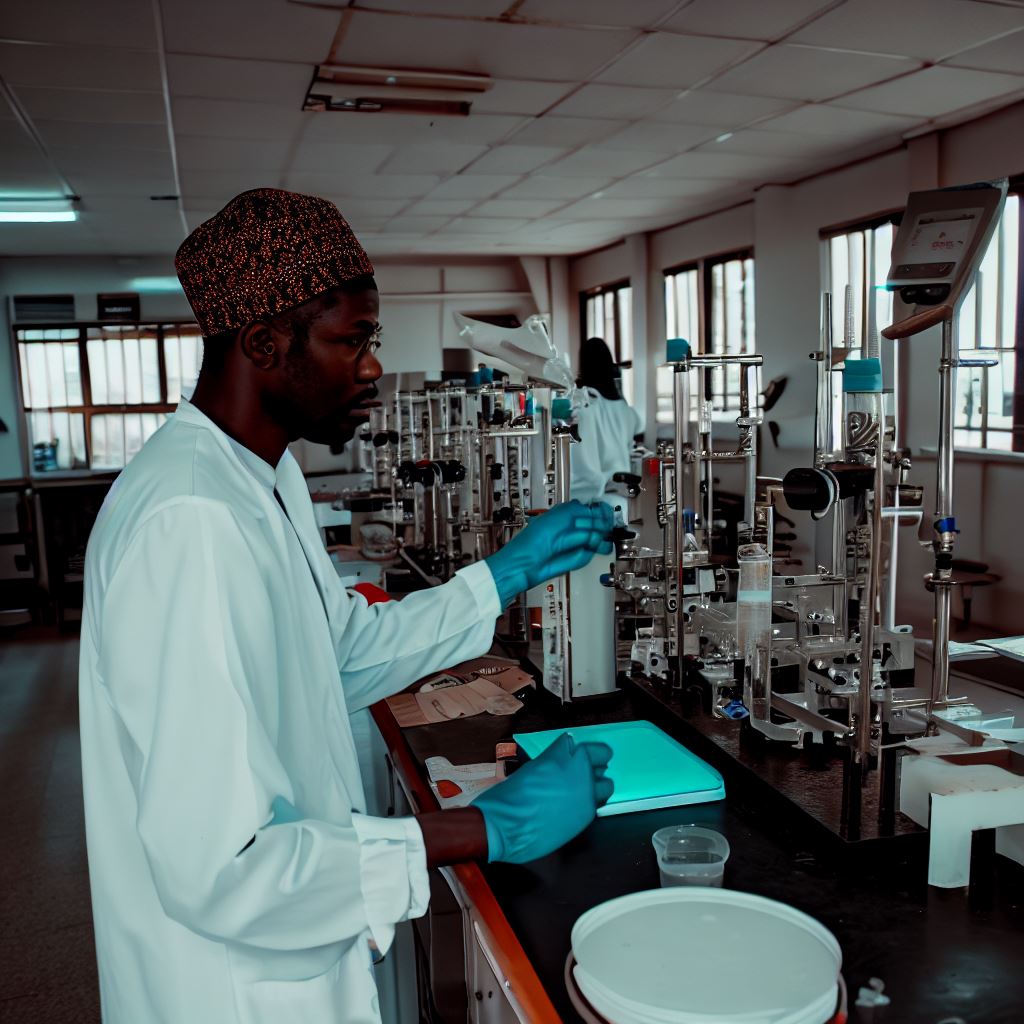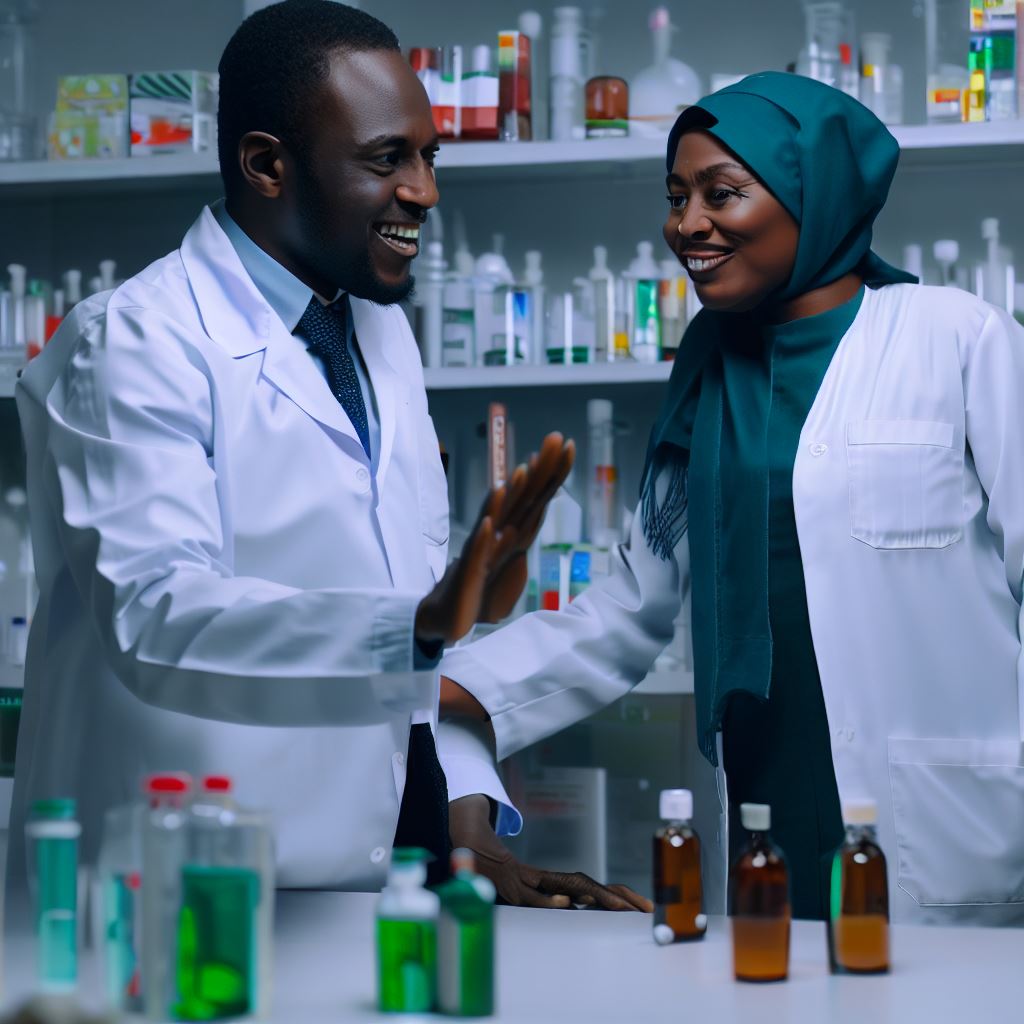Introduction
A. The importance of biochemistry labs in scientific research
Biochemistry labs play a crucial role in scientific research by providing a controlled environment for experiments and analysis.
These labs aid researchers in studying chemical processes in living organisms, advancing knowledge in medicine, agriculture, and environmental science.
B. The significance of touring biochemistry labs in Nigeria
Touring biochemistry labs in Nigeria offers unique insights into the country’s scientific capabilities and contributions.
Nigeria is home to several world-class research institutions and universities that have well-equipped biochemistry labs.
Exploring these labs allows visitors to witness firsthand the cutting-edge technologies and innovative research being conducted in the country.
Furthermore, touring biochemistry labs in Nigeria allows for cross-cultural exchange and collaboration opportunities.
Visitors can interact with Nigerian scientists and researchers, exchanging ideas and experiences to foster scientific growth.
This interaction can lead to the development of collaborative projects that tackle global challenges and promote scientific advancements.
Additionally, experiencing biochemistry labs in Nigeria can inspire and motivate young students and aspiring scientists.
Viewing cutting-edge facilities and impactful research can inspire them to choose biochemistry careers and enrich the scientific community.
In fact, biochemistry labs are essential for scientific research, and touring them in Nigeria offers a multitude of benefits.
From gaining insights into the country’s scientific achievements to fostering cross-cultural collaboration, these tours are both educational and inspiring.
They serve as a reminder of the importance of biochemistry labs in advancing scientific knowledge and addressing global challenges.
Overview of Biochemistry Labs in Nigeria
In Nigeria, biochemistry labs play a crucial role in the advancement of scientific research and contribute significantly to the country’s scientific community.
These labs are equipped with state-of-the-art facilities and are focused on various research areas related to biochemistry.
A. General Description of Biochemistry Labs in Nigeria
- Nigeria boasts several well-established biochemistry labs that are renowned for their cutting-edge research.
- These labs are usually found in universities, research institutions, and government-supported laboratories.
- They are staffed by highly skilled biochemists and scientists who work diligently to further the field of biochemistry.
- The labs are equipped with advanced instruments and technology necessary for cutting-edge research.
- They prioritize safety measures, ensuring a secure working environment for researchers.
B. Research Areas and Facilities in Nigerian Biochemistry Labs
Nigerian biochemistry labs encompass a diverse range of research areas that contribute to various scientific fields.
- One common research area is the study of enzymes and their applications in different industries.
- Other focus areas include molecular biology, protein structure and function, genetic engineering, and drug development.
- These labs usually have specialized facilities such as Centrifuges, Spectrophotometers, Microscopes, Gel electrophoresis systems, and PCR machines.
- The labs also provide access to advanced infrastructure like DNA sequencers, mass spectrometers, and chromatography systems.
C. Contribution of Nigerian Biochemists to the Scientific Community
Nigerian biochemists have made significant contributions to the global scientific community.
- They have published groundbreaking research papers in prestigious international journals.
- Their findings have advanced our understanding of various biochemical processes and their applications.
- Nigerian biochemists have developed innovative solutions for industrial challenges, such as enzyme-based biofuel production.
- These scientists actively participate in international conferences, sharing their findings and collaborating with researchers globally.
- They have also played a vital role in fostering a scientific community within Nigeria, promoting knowledge sharing and collaboration.
- Nigerian biochemists have received recognition and accolades for their research contributions to the field.
In short, biochemistry labs in Nigeria are dynamic centers of scientific research, equipped with state-of-the-art facilities and staffed by highly skilled biochemists.
They cover a wide range of research areas and have made significant contributions to the global scientific community.
Read: Biochemistry Research Trends in Nigeria
Benefits of Touring Biochemistry Labs in Nigeria
When it comes to the field of biochemistry, touring labs in Nigeria can provide numerous benefits for students and researchers alike.
These labs offer unique opportunities to gain practical knowledge, observe cutting-edge research, and collaborate with Nigerian scientists.
A. Advantages for Students and Researchers
- Access to State-of-the-Art Facilities: Nigerian biochemistry labs feature modern tech and advanced tools for students and researchers to use.
- Hands-On Learning Experience: Visiting these labs enables hands-on learning and practical skills acquisition beyond theoretical knowledge.
- Exposure to Diverse Research Projects: Nigerian biochemistry labs conduct diverse research projects, exposing visitors to various study areas and biochemistry fields.
- Networking and Collaboration: Visiting these labs offers the chance to interact and connect with Nigerian scientists, fostering collaboration and the exchange of ideas. This networking can lead to future research partnerships and collaborations.
- Enhancement of Professional Development: Immersing oneself in an active laboratory environment contributes to personal and professional growth. It allows for the development of critical thinking, problem-solving, and teamwork skills.
B. Observing Cutting-Edge Research, Techniques, and Equipment
One of the main advantages of touring biochemistry labs in Nigeria is the opportunity to witness cutting-edge research firsthand.
These labs are at the forefront of scientific advancements, employing innovative techniques and utilizing state-of-the-art equipment.
Visitors can observe experiments and studies that address pressing global challenges, such as disease treatment, renewable energy, and environmental sustainability.
Witnessing these breakthroughs inspires creativity and fosters a deeper understanding of the potential of biochemistry.
C. Potential for Collaboration and Networking with Nigerian Scientists
Another significant benefit of touring biochemistry labs in Nigeria is the potential for collaboration and networking.
- Through collaboration, researchers can pool resources, share data, and collectively tackle complex research questions.
- This can lead to novel discoveries and groundbreaking findings, ultimately advancing the field of biochemistry.
- The networking opportunities offered by these tours extend beyond academic collaborations.
- Engaging with Nigerian scientists also allows for the exchange of cultural experiences and insights, fostering mutual respect and understanding.
Visiting biochemistry labs in Nigeria presents students and researchers with numerous benefits.
Tours offer access to research, diverse projects, hands-on learning, and networking with Nigerian scientists.
By embracing these opportunities, individuals can enhance their understanding of biochemistry, develop crucial skills, and contribute to scientific advancements.
Moreover, the collaboration and networking fostered during these tours have the potential to drive groundbreaking research and foster international partnerships.
Therefore, touring biochemistry labs in Nigeria is not only educational but also serves as a catalyst for personal, professional, and scientific growth.
Read: Skills Needed for Biochemistry in Nigeria
Prominent Biochemistry Labs in Nigeria
A. University of Lagos Biochemistry Lab
- Focus: Biochemical research on drug discovery and development.
- Achievements: Development of new anti-malarial drugs with reduced side effects.
- Unique Features: State-of-the-art equipment for molecular analysis and protein purification.
B. Ahmadu Bello University Biochemistry Lab
- Focus: Biochemical analysis of natural products for potential pharmaceutical applications.
- Achievements: Identification of novel compounds from medicinal plants with anti-inflammatory properties.
- Unique Features: Collaboration with traditional healers for knowledge exchange in indigenous medicine.
C. University of Ibadan Biochemistry Lab
- Focus: Biochemical investigation of metabolic diseases, such as diabetes and obesity.
- Achievements: Discovery of new markers for early diagnosis of diabetes and development of personalized treatment strategies.
- Unique Features: Animal models mimicking human metabolic disorders for translational research.
D. Obafemi Awolowo University Biochemistry Lab
- Focus: Biochemical and molecular analysis of cancer progression and targeted therapies.
- Achievements: Identification of key biomarkers for cancer prognosis and development of novel drug delivery systems.
- Unique Features: Tissue culture facility for studying cancer cell lines and testing new anti-cancer compounds.
E. Federal University of Technology, Minna Biochemistry Lab
- Focus: Biochemical and biotechnological research for sustainable agriculture and food security.
- Achievements: Development of enzyme-based technologies for improving crop productivity and nutrient content.
- Unique Features: Greenhouse facilities for conducting experiments on genetically modified crops.
F. University of Nigeria, Nsukka Biochemistry Lab
- Focus: Biochemical analysis of natural products for drug discovery and development.
- Achievements: Isolation and characterization of bioactive compounds from indigenous medicinal plants.
- Unique Features: Collaboration with local communities to document traditional medicinal knowledge.
G. Biochemistry Lab at Bayero University Kano
- Focus: Biochemical research on infectious diseases, particularly malaria and tuberculosis.
- Achievements: Identification of drug targets in disease-causing parasites and development of potential anti-malarial agents.
- Unique Features: Biosafety level 3 containment facility for working with highly infectious pathogens.
H. Biochemistry Lab at the University of Port Harcourt
- Focus: Biochemical analysis of environmental pollutants and their impact on living organisms.
- Achievements: Identification of biomarkers for assessing pollution levels in aquatic ecosystems.
- Unique Features: High-resolution mass spectrometry for analyzing complex environmental samples.
These prominent biochemistry labs in Nigeria are at the forefront of cutting-edge research, making significant contributions to various fields of study.
Researchers and students alike benefit from their expertise and state-of-the-art facilities.
Read: Biochemistry: Key Universities in Nigeria

Challenges Faced by Biochemistry Labs in Nigeria
A. Limitations and constraints faced by biochemistry labs in Nigeria
In Nigeria, biochemistry labs encounter various limitations and constraints that hinder the progress of research and development in the field.
These challenges include:
- Lack of Infrastructure: Biochemistry labs face inadequate physical infrastructure, including proper laboratory facilities, which often impedes research activities.
- Insufficient Funding: Limited funding hampers labs, making it tough to procure necessary equipment, reagents, and experiment materials.
- Lack of Advanced Equipment: Funding constraints limit lab access to advanced equipment, hindering cutting-edge research in Nigerian biochemistry labs.
- Shortage of Skilled Personnel: Labs lack skilled staff, limiting their ability to perform complex experiments in biochemistry.
- Inadequate Power Supply: Power outages harm biochemistry labs, as experiments demand a stable power supply.
B. Addressing Infrastructure Deficiencies, Funding Issues, and Lack of Advanced Equipment
- Government Intervention: Nigeria’s government should prioritize lab investment by funding infrastructure and advanced equipment procurement.
- Public-Private Partnerships: Lab-private collaborations bridge funding gaps and grant access to modern equipment and resources.
- Research Grants: Funding agencies should grant more biochemistry lab-specific research funds to support projects and ease financial constraints.
- Capacity Building Programs: Initiatives should be launched to train and develop skilled biochemists and lab technicians to address the shortage of qualified personnel.
- Renewable Energy Solutions: Implementing solar power systems can mitigate the effects of unreliable electricity supply on lab operations.
C. Efforts to Overcome Challenges and Improve the Research Environment
Despite these challenges, several commendable efforts are being made to overcome them and improve the research environment within biochemistry labs in Nigeria:
- Collaborative Research Projects: Labs are increasingly joining forces to conduct research projects, pooling resources and expertise.
- International Partnerships: Collaborating with foreign institutions enhances knowledge exchange, equipment access, and research partnerships.
- Technology Transfer: Institutes actively pursue tech transfer for modern research tool integration in their labs.
- Research Funding Opportunities: Government and international bodies offer increased funding via grants and scholarships for biochemistry research.
- Advocacy and Support: Professional groups push for better recognition and support for biochemistry labs to foster research-friendly environments.
In essence, biochemistry labs in Nigeria face various challenges, including infrastructure deficiencies, funding issues, and a lack of advanced equipment.
Government intervention, public-private partnerships, and capacity-building efforts aim to surmount these obstacles and enhance the research environment.
Collaborative research projects, international partnerships, and technology transfer programs also contribute to enhancing the capabilities of biochemistry labs in Nigeria.
With continued support and investment, these labs can thrive and contribute significantly to the field of biochemistry in the country.
Read: The Role of Women in Nigerian Biochemistry
Tips for Visiting Biochemistry Labs in Nigeria
A. Practical advice for individuals planning to tour biochemistry labs in Nigeria
Visiting biochemistry labs in Nigeria can be an exciting and educational experience.
However, it is important to ensure that you follow certain guidelines, obtain the necessary permissions, and conduct yourself appropriately during the visit.
In this blog section, we will provide practical advice for individuals planning to tour biochemistry labs in Nigeria.
1. Obtaining Necessary Permissions
Before visiting any biochemistry lab in Nigeria, it is crucial to obtain the necessary permissions.
Contact the lab or university administration well in advance to inquire about their visitation policies and any required permits.
2. Making Appointments in Advance
To guarantee a smooth and successful lab visit, make appointments in advance.
Labs are often busy with experiments, so ensure that your visit does not disrupt their ongoing work. This will also allow the lab staff to prepare for your visit.
3. Dress Code
- When visiting biochemistry labs in Nigeria, it is important to dress appropriately.
- Wear closed-toe shoes, long pants, and a lab coat or a protective gown.
- This will ensure your safety and prevent any contamination of the lab environment.
4. Lab Etiquette and Behavior
Maintain proper lab etiquette during your visit.
Follow any instructions provided by the lab staff and adhere to safety guidelines.
Be respectful of the equipment and specimens, and do not touch anything without explicit permission.
5. Follow Safety Protocols
- Lab safety is of utmost importance when visiting biochemistry labs.
- Familiarize yourself with the safety guidelines and protocols of the lab.
- Ensure you wear the necessary personal protective equipment (PPE) and follow best practices to prevent accidents or injuries.
6. Ask Permission to Take Photos or Record
Always ask for permission before taking any photos or recording videos in biochemistry labs.
Some labs may have policies regarding the use of cameras and recording devices due to the sensitivity of the experiments being conducted.
7. Respect Privacy and Confidentiality
During your lab visit, you may encounter sensitive research or proprietary information.
It is essential to respect the privacy and confidentiality of the researchers and their work.
Do not share or discuss any information without their explicit consent.
8. Be Mindful of Noise and Disturbance
Research labs require a quiet and focused environment.
Be mindful of noise levels and avoid creating disturbances.
Keep your voice low and refrain from touching or tampering with any equipment or samples without permission.
9. Ask Questions and Engage
Visiting biochemistry labs is an opportunity to learn and expand your knowledge.
Take advantage of this by asking questions and engaging with the lab staff.
They are often knowledgeable and happy to share insights about their work.
10. Reflect on Your Experience
- After your lab visit, take the time to reflect on what you have learned.
- Consider the impact of the experiments and research conducted in biochemistry labs in Nigeria.
- Appreciate the efforts put into advancing scientific knowledge and its potential applications.
Visiting biochemistry labs in Nigeria can be a fascinating experience.
To maximize your visit, secure permissions, schedule ahead, adhere to lab etiquette, and engage with staff.
Remember to respect their work and be grateful for the opportunity to witness scientific advancements firsthand.
Success Stories and Impact of Biochemistry Labs in Nigeria
Biochemistry labs in Nigeria have witnessed remarkable success stories and made significant impacts in various areas.
Nigerian researchers have been at the forefront of groundbreaking discoveries and innovative studies.
A. Success stories of Nigerian researchers or research projects conducted in biochemistry labs
Dr. Oluwatosin Akinsola, a renowned Nigerian biochemist, conducted extensive research on cancer treatment.
Her findings revolutionized the approach to cancer therapy in Nigeria, leading to more effective and targeted treatments for patients.
Also, a team of Nigerian researchers made a remarkable breakthrough in environmental sustainability by discovering a novel enzyme capable of breaking down plastic waste.
This discovery has the potential to address the global plastic pollution crisis and promote a more sustainable future.
Professor Chinedu Okoye’s research on sickle cell disease has also garnered significant attention.
His work has contributed to the development of a new drug that shows promise in treating this debilitating genetic disease.
This breakthrough holds great potential for improving the quality of life for thousands of Nigerian patients suffering from sickle cell disease.
In the field of neurodegenerative diseases, Dr. Funmilayo Adewole’s study on Alzheimer’s disease identified a new target for drug therapy.
This research has paved the way for the development of new drugs that can potentially slow down the progression of the disease and improve the lives of those affected.
B. Positive impact of biochemistry labs
- Biochemistry labs play a crucial role in advancing scientific knowledge and understanding in Nigeria.
- The research conducted in these labs contributes to the development of new drugs and therapies.
- Biochemistry labs aid in the identification and characterization of disease markers for early diagnosis.
- The pharmaceutical industry in Nigeria heavily relies on biochemistry labs for the discovery of new drugs.
- Biochemistry labs contribute to the overall improvement of healthcare by providing diagnostic tools and techniques.
C. Recognition and awards received by Nigerian biochemists for their research
- Dr. Oluwatosin Akinsola was awarded the prestigious Nigerian Medical Scientist of the Year for her cancer research.
- The team of Nigerian researchers working on plastic waste received the National Research Excellence Award.
- Professor Chinedu Okoye was honored with the African Union Scientific Award for his groundbreaking sickle cell research.
- Dr. Funmilayo Adewole’s study on Alzheimer’s disease was recognized with the Young Investigator Award in Biochemistry.
Basically, Nigerian biochemistry labs drive scientific progress, enhance healthcare, and aid the pharmaceutical sector.
Nigerian researchers have achieved remarkable success, leading to groundbreaking discoveries and receiving well-deserved recognition and awards for their contributions.
These achievements serve as a testament to the importance and potential of biochemistry research in Nigeria.
Conclusion
Biochemistry labs in Nigeria play a significant role in scientific advancement. They provide a platform for research, education, and innovation.
By touring these labs, individuals can gain valuable knowledge and insights into the field of biochemistry.
It is essential to support and invest in these labs to foster scientific growth in Nigeria.
Through continuous funding, equipment, and resources, these labs can continue to make groundbreaking discoveries and contribute to the advancement of biochemistry in Nigeria.
Therefore, I encourage everyone to explore the opportunity of touring biochemistry labs in Nigeria for educational and research purposes.
It is through these visits that we can fully appreciate the importance of biochemistry labs and their contribution to scientific development in the country.
Let us continue to support and invest in these labs to ensure a bright future for biochemistry research in Nigeria.




